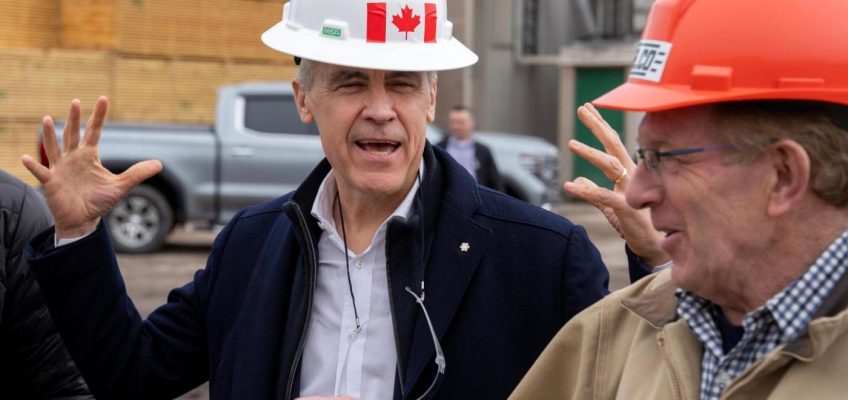By JESSE BEDAYN, Associated Press/Report for America
DENVER (AP) — As Americans struggle under backbreaking rental prices, builders are turning to innovative ways to churn out more housing, from 3D printing to assembling homes in an indoor factory to using hemp — yes, the marijuana cousin — to make building blocks for walls.
It’s a response to the country’s shortfall of millions of homes that has led to skyrocketing prices, plunging millions into poverty.
“There’s not enough homes to purchase and there’s not enough places to rent. Period,” said Adrianne Todman, the acting secretary of the U.S. Department of Housing and Urban Development under former President Joe Biden.
Modular homes wrapped in plastic await shipping outside of the Fading West factory in Buena Vista, Colo., on Feb. 19, 2025. (AP Photo/Thomas Peipert)
One way to quickly build more is embrace these types of innovations, Todman said. “I can only imagine what our housing situation would be like now if we could have made a decision to be more aggressive in adopting this type of housing” decades ago.
So what are these new ways of building homes? And can they help reduce the cost of new housing, leading to lower rents?
Factory-built housing put together in a week
In a cavernous, metal hall, Eric Schaefer stood in front of a long row of modular homes that moved through the plant, similar to a car on an assembly line.
At a series of stations, workers lay flooring, erected framing, added roofs and screwed on drywall. Everything from electrical wiring to plumbing to kitchen countertops were in place before the homes were shrink-wrapped and ready to be shipped.
A worker inspects the framing of a modular home at the Fading West factory in Buena Vista, Colo., on Feb. 19, 2025. (AP Photo/Thomas Peipert)
The business in the Colorado Rocky Mountains, Fading West, has pumped out more than 500 homes in its just over three years of operation, each taking just five to seven days to build, even in the coldest winter months, Schaefer said.
Once assembled in the plant, the narrow townhouse-style homes with white trim, balconies and front porches, are about 90% done. At their final destination they are move-in ready within six weeks, Schaefer said.
The company works with towns, counties and housing nonprofits to help address the shortage of affordable homes, mostly for workers who’ve been squeezed out by sky-high prices in ritzy mountain towns.
Workers construct modular homes at the Fading West factory in Buena Vista, Colo., on Feb. 19, 2025. ( AP Photo/Thomas Peipert)
That includes Eagle, Colorado, not far from the Vail ski resort, where Fading West worked with Habitat for Humanity to install modular homes at affordable rents for teachers and other school district employees. The homes tend to be on the smaller side, but can be multifamily or single family.
“You can build faster. The faster you build — even at a high quality — means the lower the price,” Schaefer said. “We see this as one of the pieces to the puzzle in helping solve the affordable housing crisis.”
There’s a hefty upfront cost to build the factory, and part of the challenge is a lack of state and federal investment, he said. A patchwork of building codes governing how a structure can be built also makes it difficult, requiring changes to the construction depending on the town or county it is being sent to.
Modular homes built by Fading West are seen in Buena Vista, Colo., on Feb. 19, 2025. (AP Photo/Thomas Peipert)
Manufactured housing is similar to modular housing, but the units are constructed on a chassis — like a trailer — and they aren’t subject to the same local building codes. That’s part of the reason they are used more broadly across the U.S.
Roughly 100,000 manufactured homes were shipped to states in 2024, up from some 60,000 a decade earlier, according to Census Bureau data. Estimates of modular homes built annually often put them below 20,000.
3D printing is innovative but still ‘a long game’
Yes, there’s technology to 3D print homes.
A computer-controlled robotic arm equipped with a hose and nozzle moves back and forth, oozing lines of concrete, one on top of the other, as it builds up the wall of a home. It can go relatively quickly and form curved walls unlike concrete blocks.
Modular homes built by Fading West are seen in Buena Vista, Colo., on Feb. 19, 2025. (AP Photo/Thomas Peipert)
Grant Hamel, CEO and co-founder of VeroTouch, stood inside one of the homes his company built, the wall behind him made out of rolling layers of concrete, distinct to a 3D printer. The technology could eventually reduce labor costs and the time it takes to build an abode, but is farther off than manufactured or modular methods from making a dent in the housing crisis.
It’s “a long game, to start chipping away at those prices at every step of the construction process,” Hamel said.
A worker constructs the window of a modular home at the Fading West factory in Buena Vista, Colo., on Feb. 19, 2025. (AP Photo/Thomas Peipert)
The 3D printers are expensive, and so are the engineers and other skilled employees needed to run them, said Ali Memari, director of the Pennsylvania Housing Research Center, whose work has partly focused on 3D printing. It’s also not recognized by international building codes, which puts up more red tape.
The technology is also generally restricted to single-story structures, unless traditional building methods are used as well, Memari said
It’s “a technology at its beginning, it has room to grow, especially when it is recognized in code,” Memari said. “The challenges that I mentioned exist, and they have to be addressed by the research community.”
Workers construct the flooring of a modular home at the Fading West factory in Buena Vista, Colo., on Feb. 19, 2025. (AP Photo/Thomas Peipert)
A hemp-and-lime mixture called hempcrete has ‘a bright future’
Hemp — the plant related to marijuana — is being used more and more in the construction of walls.
The hemp is mixed with other materials, most importantly the mineral lime, forming “hempcrete,” a natural insulation that’s mold- and fire-resistant and can act as outer wall, insulation and inner wall.
A worker stands inside a framed modular home at the Fading West factory in Buena Vista, Colo., on Feb. 19, 2025. (AP Photo/Thomas Peipert)
Hempcrete still requires wood studs to frame the walls, but it replaces three wall-building components with just one, said Memari, also a professor at Penn State University’s Department of Civil and Environmental Engineering. Memari is now helping oversee research into making hempcrete that doesn’t need the wood studs.
As much as a million hemp plants to be used for hempcrete can grow on one acre in a matter of months as opposed to trees, which can take years or decades to grow.
A worker constructs part of a modular home at the Fading West factory in Buena Vista, Colo., on Feb. 19, 2025. (AP Photo/Thomas Peipert)
The plant is part of the cannabis family but has far less of the psychoactive component, THC, found in marijuana. In 2018, Congress legalized the production of certain types of hemp. Last year, the International Code Council, which develops international building codes used by all 50 states, adopted hempcrete as an insulation.
Related Articles
Developer plans six-story, mixed-use project at Grand Avenue and Victoria Street in St. Paul
US home sales rose in February as mortgage rates eased and more homes put up for sale
Three St. Paul City Council members move to end rent control for new construction
California mini-storage company expands into St. Paul’s Lowertown
St. Paul: Balsam on Broadway opens in Lowertown, one of several housing developments for downtown
Confusion over the legality of growing hemp and the price tag of the machine required to process the plant, called a decorticator, are barriers to hempcrete becoming more widespread in housing construction, Memari said.
Still, he said, “hempcrete has a bright future.”
Associated Press video journalist Thomas Peipert contributed to this report from Buena Vista, Colorado.
Bedayn is a corps member for the Associated Press/Report for America Statehouse News Initiative. Report for America is a nonprofit national service program that places journalists in local newsrooms to report on undercovered issues.




